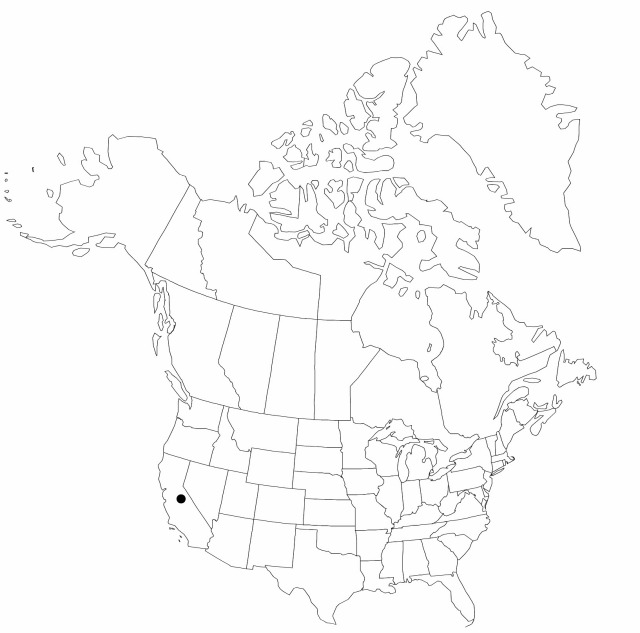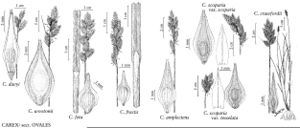Carex davyi
Bull. Torrey Bot. Club 43: 606. 1917.
Plants densely cespitose. Culms 23–37 cm. Leaves: sheaths adaxially white-hyaline, summits U-shaped or rounded; distal ligules 1–2.5 mm; blades 2–4 per fertile culm, 7–13 cm × (1.5–)2–3 mm. Inflorescences open, brown or orange-brown, (1–)1.8–3 cm × 6–11 mm; proximal internode 4.5–9 mm; 2d internode, when present, 2–7 mm; proximal bracts scalelike or tipped with stout awn or bristle, shorter than inflorescences. Spikes (1–)2–3, distant, distinct, narrowly oblanceloid to oblanceloid, (12–)14–22 × 5.5–7 mm, base attenuate, apex acute to rounded. Pistillate scales reddish brown or gold, with pale gold midstripe, lanceolate, 4.5–5.8 mm, 3/4 length of and narrower than perigynia, margin white, 0–0.15 mm wide, apex acute. Staminate scales with white-hyaline margin 0–0.2 mm wide. Perigynia appressed to appressed-ascending, green to gold, conspicuously 8–14-veined abaxially, conspicuously 4–8-veined adaxially, at least 3 adaxial veins longer than achene, lanceolate to ovate, plano-convex, 5.9–8.5 × 1.5–2.2 mm, (0.5–)0.6–0.7 mm thick, margin flat, including wing 0.3–0.5(–0.6) mm wide, ciliate-serrulate at least distally; beak red-brown or brown, often white-hyaline at tip, usually cylindric, unwinged, ± entire for 0.5–0.8 mm, occasionally flat, ± ciliate-serrulate, abaxial suture inconspicuous, distance from beak tip to achene (2.6–)3–4.1 mm. Achenes ovate, elliptic, or obovate, (1.9–)2–3 × 1.1–1.5 mm, 0.4–0.7 mm thick.
Phenology: Fruiting late summer.
Habitat: Moist meadows, rocky slopes
Elevation: 1500–3200 m
Distribution

Calif.
Discussion
Selected References
None.
